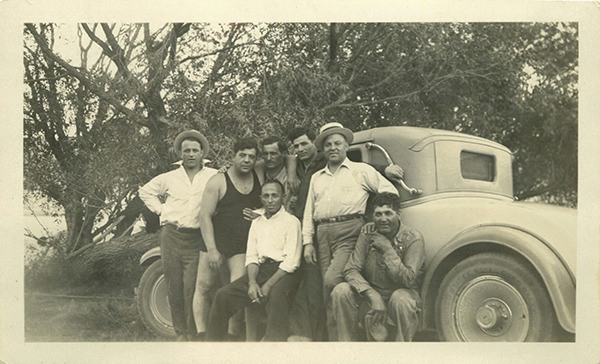Author Jewelli DeLay grew up hearing stories about her great-grandfather, Frank Gatt, a notorious bootlegger in the Puget Sound region during the Prohibition Era.
“I lived at my grandma’s (Gatt’s daughter, Rosemary’s) house as a teenager and heard all of the stories,” she said. “When she passed away, I inherited everything she had about him.”
While DeLay may have thought she knew most of what there was to know about the great-grandfather she had never met, surprises awaited her when she began poking about in the treasure trove her grandmother had left. And a more complete picture of Gatt’s career as a bootlegger, businessman and family man began to emerge.
“It was just neat,” DeLay said. “There was so much good stuff.”
Included among the treasures was a collection of photos of Gatt and his family, taken by renowned Pacific Northwest photographer Asahel Curtis, one of Gatt’s close friends.
Armed with the family heirlooms, DeLay, a first-time author, set out to document her great-grandfather’s bootlegging career.
 The result is “The Gentleman Bootlegger”, published by Inkwater Press and co-written with Auburn native Rob Robinson, a history teacher at Cascade Middle School. The book, which includes several of Curtis’ photographs, details Gatt’s life from the beginning of Prohibition in 1919 to his 1935 arrest on tax evasion charges.
The result is “The Gentleman Bootlegger”, published by Inkwater Press and co-written with Auburn native Rob Robinson, a history teacher at Cascade Middle School. The book, which includes several of Curtis’ photographs, details Gatt’s life from the beginning of Prohibition in 1919 to his 1935 arrest on tax evasion charges.
“I put the book together and (Robinson) helped me finish it up,” DeLay said. “It took me about four years to write. I went to the National Archives for all his court records. I have about 10 boxes filled with stuff.”
According to the book, Gatt got his start in the liquor business in 1916 after he bought a saloon in Butte, Mont.
In 1919, when the 18th Amendment made the production, sale and transportation of booze illegal, Gatt turned to bootlegging.
“He had a young family to support, and that’s all he knew,” DeLay said.
The book illustrates Gatt’s career, distilling liquor at stills scattered throughout King and Pierce counties, and distributing it through soda shopslike the Monte Carlo on Fifth Avenue in Seattle.
“(The Monte Carlo) had a barbershop right when you went in,” DeLay said. “People were doing haircuts when you walked by the window. He (Gatt) was very brilliant — he used rooms in the hotel above the Monte Carlo to store liquor.”
DeLay said Gatt managed to stay a step ahead of law enforcement for the first decade of his bootlegging career, helped by several Seattle police officers on his payroll.
“He paid police officers $1,000 a week,” she said. “They kept trying so hard to bust him, but they didn’t do a very good job. He kept finding ways out.”
In 1935, however, Gatt couldn’t find his way out of the tax evasion rap. He ended up serving two years at McNeil Island Penitentiary.
After his parole in 1937, Gatt did not return to his criminal past. Instead, he began a new career as a contractor, building houses.
DeLay, already at work on another book, said her great-grandfather’s criminal past is not a mark of shame.
“My grandma was very embarrassed by it and shamed. But I think it’s partly because he made so much money, and she was raised in boarding school year round. I think she would have rather been poor and at home like other girls,” DeLay said.
“I’m very proud of it. I don’t think that it was a law that should have gone into effect.”
For more information on “Gentleman Bootlegger”, visit www.thegentlemanbootlegger.com.

